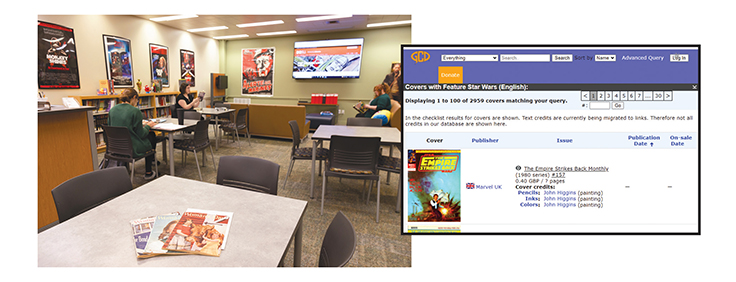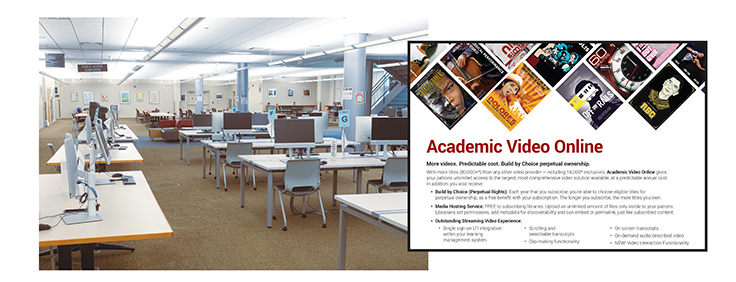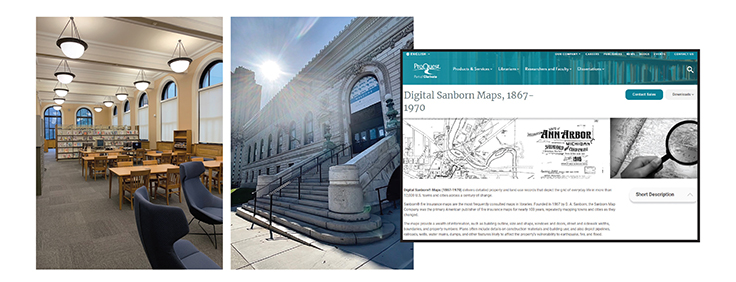Reference Open House
Walk through the doors of libraries across the nation where patrons are fully engaged in research and discovery. The staff at the Browne Pop Culture Library, a professor of library and information science and department chair of the Kennedy-King College Library, and the adult information services supervisor at the Springfield City Library offer tours and highlight the resources that enable scholarly pursuits in fields as varied as romance fiction, the African American diaspora, and changing city landscapes.
Walk through the doors of libraries across the nation where patrons are fully engaged in research and discovery. The staff at the Browne Pop Culture Library, a professor of library and information science and department chair of the Kennedy-King College Library, and the adult information services supervisor at the Springfield City Library offer tours and highlight the resources that enable scholarly pursuits in fields as varied as romance fiction, the African American diaspora, and changing city landscapes.
Browne Pop Culture Library
The Ray and Pat Browne Library for Popular Culture Studies (a.k.a. the Browne Popular Culture Library or BPCL) is located on the fourth floor of Jerome Library on the main campus of Bowling Green State University (BGSU) in Bowling Green, OH. Dr. Ray Browne began the Department of Popular Culture at BGSU and is arguably the founder of the popular-culture studies movement in the United States. He, along with other pioneers in the field, created the BPCL in 1969 to support the study of popular culture at BGSU. What began as an eclectic, donated collection of popular fiction and some comics has grown into the largest and most comprehensive archive of its kind in the United States, dedicated to acquiring and preserving research materials on American popular culture (post-1876) for curricular and research use. With large, research-level collections in popular entertainment, popular fiction, and the graphic arts, the BPCL is an interdisciplinary researcher’s dream. Several smaller collections in teen culture and counterculture, fandom, foodways and cookery, and advertising images round out BPCL’s holdings. Much of the collection is from devoted collectors and fans, so it is fitting that BPCL uses fan-made databases as authoritative resources when describing materials. This makes the collection as accessible and findable as possible. Three databases that are invaluable when describing rather uncommon materials are the Grand Comics Database, Fanlore, and Romance Wiki.
The Grand Comics Database (GCD) is an open web resource dedicated to collecting in-depth information about comic books and graphic novels. Expert contributors maintain and update the GCD on a volunteer basis, capturing exceptionally rich metadata about individual comics issues as well as comics stories that span multiple issues and comics series that comprise many stories and/or issues. Users can search for information by publisher, creator (differentiating between script writers, pencil artists, inkers, colorists, letterers, and story editors), genre, series, date, and country of publication. Such in-depth comics information is rarely found in other databases, particularly about such an encyclopedic range of comics genres. The database also includes a wealth of digitized comic-book covers; these include helpful metadata such as transcribed text and keywords describing the visual content of the cover art. The GCD is an indispensable tool for advanced comics scholars and ardent fans alike, both of whom are regular user groups of the BPCL.

Fanlore is a project by the Organization for Transformative Works, the premier source for the preservation of fanworks and fandom history. As a wiki, Fanlore is created and maintained by knowledgeable fans, many with insider experience of the events and media they write about. Since fandoms are largely informal and underground, their communities are prone to loss from censorship and policy change, making Fanlore invaluable for researching fandom culture. Often, Fanlore is the only place to find information about its subjects. The website contains pages on different fandoms, their histories, events, big-name fans, and controversies, as well as general fandom terminology. At the BPCL, their extensive documentation on printed fanzines has been highly useful for cataloguing several large donations of zines with scant information elsewhere.
One of the BPCL’s strengths is the Romance Fiction collection, which contains tens of thousands of mass-market paperbacks and hardbound books, category romances, serialized romances, and manuscript collections from romance authors and organizations. To properly describe these materials as well as to assist with reference queries, one of the resources employed frequently is Romance Wiki (not to be confused with Wikipedia’s romance page). Anyone who wishes to “help tell the stories behind the romance” is welcome (be they writers, readers, reviewers, academics, publishing professionals, or simply fans), and the site includes vast amounts of data about authors, books, and publishers, as well as information on romance genres, history, communities, awards, cover artists, and organizations.
Stefanie Hunker is Interim Head Librarian at the BPCL and Chair of Special Collections at BGSU (specialty: romance fiction, film/television); Tyne Lowe is the Manuscripts Archivist at the BPCL (specialty: comics and art history); Dana Nemeth is the Reference Archivist at the BPCL (specialty: popular culture theory and history); Aurora Taylor is a doctoral candidate in American Culture Studies at BGSU and Graduate Assistant at the BPCL (specialty: film/television).
Kennedy-King College Library
On the tree-lined campus of Kennedy-King College (KKC), a public two-year community college, sits the red brick building housing the two-story, 30,000-square-foot library. Located in the historically Black neighborhood of Englewood in Chicago, the library and higher-ed institution are part of the City Colleges of Chicago system, which includes seven schools and is one of the largest community-college districts in Illinois. Founded as Woodrow Wilson Junior College in 1935, the campus was renamed for Sen. Robert Kennedy and Dr. Martin Luther King Jr. in 1969. The school’s first graduating class, in 1936, included poet Gwendolyn Brooks, who in 1950 became the first Black person to win a Pulitzer Prize.
The library houses the one-of-a-kind McWorter Marsh reference collection—1,500 books that focus on the culinary history, cooking techniques, and traditions of Black Americans. The books were donated by scholar/activist Abdul Alkalimat and his sister Sandra McWorter Marsh. The two are direct descendants of Free Frank McWorter, who was born into enslavement but eventually bought his freedom and that of 14 family members. In 1836, he became the first Black person to register a town: New Philadelphia, IL. Students at KKC’s Washburne Culinary and Hospitality Institute can access these titles.
To supplement these reference materials, the college offers digital culinary resources through the Opposing Viewpoints in Context database. The KKC culinary school’s curriculum is designed to expand students’ ideas about food and food culture, and this Gale database allows culinary faculty and students to access scholarly documents and mainstream publications that focus on the entire culinary ecosystem. Students gain a broader idea of where their ingredients come from and how civilizations have risen and fallen by the cultivation, transportation, and manufacturing of what people eat.

Alexander Street’s Academic Video Online database (alexanderstreet.com/products /academic-video-online) offers thousands of hours of culinary-themed audiovisual content, such as movies, lectures, and TV episodes. There are technique videos on using specific ingredients, global food history programs, and documentaries related to food and culinary arts.
Most of the students at KKC are people of color, and the institution strives to preserve the Black and Brown experience within Chicago and the nation. One way the college’s library supports this mission is with OUR, not an acronym but named to symbolize that its cross-disciplinary collection of books by Black authors that examine and preserve the African American diaspora is designed primarily for BIPOC readers. OUR is constantly evaluated, added to, and thoughtfully curated, increasing its use and effectiveness.
OUR is heavily supplemented by ABC-CLIO’s African American Experience database (abc-clio.com/products/afaaw), containing millions of digital items (text, image, audio, and video) that capture the African American diaspora regionally and nationally. It covers topics related to the lived experiences and obstacles many Black people face.
Dr. Adam Carey, professor of Library and Information Science and department chair of the Kennedy-King College Library in Chicago, earned his doctorate from Creighton University. His dissertation focused on library leadership and succession planning.
Springfield City Library
With a population of just over 150,000, Springfield, MA, is known as the “City of Firsts” as well as the home of Merriam-Webster and the Basketball Hall of Fame. The city’s varying neighborhoods make each of its nine library branches unique and inviting. Located adjacent to the downtown Springfield Museums, the Central Library is the research hub of the Springfield system. Though established many years prior, the current Central Library opened to the public in 1912 with financial assistance from Andrew Carnegie. More recently, the Brogan Research Center was created within the building to provide a stately place for researchers to work. Some of the databases used by Springfield librarians and patrons are funded by the city, while others are provided by the Massachusetts Board of Library Commissioners. Springfield residents can also take advantage of the Boston Public Library’s eCard program to access even more resources.
The Springfield Central Library has operated as a Candid Community Partner (formerly known as a Foundation Center Cooperating Collection) for many years, providing public access to Candid’s Foundation Directory as well as offering classes for local nonprofit groups on how to use the directory, the fundamentals of grant funding, and writing grants and grant budgets. The Foundation Directory collects in-depth, up-to- date information about more than 240,000 grant makers—specifically for nonprofit organizations—in the United States. Features include data-visualization tools, detailed foundation profiles, and profiles of grant recipients. Patrons interested in learning more about using the Foundation Directory to discover potential funding sources tailored to their local nonprofit are encouraged to make a one-on-one appointment with our digital services librarian.

Patrons often come to the library with legal concerns, and while staff is not allowed to offer legal help, the library provides access to Gale LegalForms. This database of forms is a one-stop shop for librarians working with patrons who are keen to find a specific document. The resource features a list of popular searches as well as a search bar and a set of broad categories, so users can easily drill down to the documents they need. More than 100 forms are available as fillable sheets, making it straightforward to enter the information required and download the output in either Microsoft Word or PDF format. Among the documents are wills, pet-care agreements, equipment leases, and landlord-tenant notices; a personal favorite is the wedding planner agreement. While Springfield City Library only has access to Massachusetts forms, Gale does make legal forms for all states available.
Reference interactions sometimes include using resources that were created for another purpose entirely. The ProQuest Digital Sanborn Maps (1867–1970) provides digital access to the detailed maps created by the Sanborn Map Company to enable fire-insurance valuation. Beginning in the 19th century, more than 12,000 cities and towns were mapped repeatedly as a part of this process, leaving a record that allows today’s librarians and researchers to reconstruct the changing landscape of property over time. As far as reference thrills go, very little tops seeing the footprint of a familiar building as it moves through 100 years of development. While the Springfield City Library subscribes only to the Massachusetts maps, images for additional states are available via subscription, and some can also be found through the Library of Congress.
Anna Mickelsen is the Adult Information Services Supervisor at the Springfield City Library in Massachusetts. When she isn’t fiddling with spreadsheets, ordering fiction, or weeding library materials, she fights tabletop adversaries and wrangles cats.
RELATED
ALREADY A SUBSCRIBER? LOG IN
We are currently offering this content for free. Sign up now to activate your personal profile, where you can save articles for future viewing









Add Comment :-
Comment Policy:
Comment should not be empty !!!